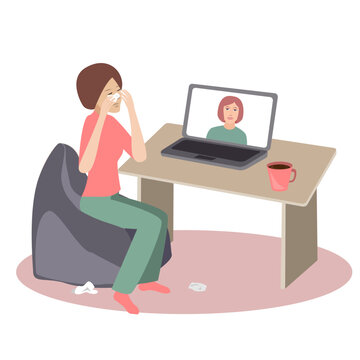In today’s fast-paced world, traditional therapy sessions can sometimes be a logistical nightmare. Between work, family obligations and other commitments, carving out time for a face-to-face session with a therapist can be difficult. But what if we told you there was a way to receive the same level of care and support from the comfort of your own home? Virtual counselling is revolutionizing the way we approach therapy – but how effective is it really? Let’s take a closer look at the power of virtual counselling and what it could mean for the future of mental health care.

What is Virtual Counselling and How Does it Work?
Virtual counselling, also known as online therapy or teletherapy, is a form of mental health treatment that takes place over the internet. Through video conferencing, phone calls, or messaging platforms, clients can connect with licensed therapists from the comfort of their own homes or anywhere with an internet connection. Virtual counselling works similarly to traditional in-person therapy sessions, with clients discussing their concerns and receiving guidance and support from their therapist. The main difference is that virtual counselling eliminates the need for physical travel to a therapist’s office, making it a more convenient option for those with busy schedules or limited mobility. Additionally, virtual counselling can be more accessible to those living in remote areas or who have difficulty accessing traditional therapy due to stigma or other barriers.

The Benefits of Virtual Counselling: Convenience, Accessibility, and More
Virtual counselling is a form of therapy where patients can receive counseling services from the comfort of their own homes. Convenience is one major benefit of virtual counselling, as it eliminates the need for travel time and allows individuals to attend sessions during their free time. Additionally, virtual counselling has improved accessibility, particularly for those who live in remote areas or have mobility issues that make it difficult to leave home.
Another advantage of virtual counselling is that it helps lessen costs associated with traditional therapy by eliminating expenses such as transportation and office space rental fees. Moreover, people living in regions with limited access to mental health resources no longer have to endure long commutes or wait times due to a shortage of therapists.
Overall, Virtual Counselling provides an effective way for people seeking support or guidance through psychotherapy because it suits different lifestyles while taking care of affordability barriers.

Overcoming Stigma: Why Virtual Counselling is Just as Effective as In-Person Therapy
There’s no denying that there is a certain stigma attached to seeking therapy. Many people worry about being judged or labeled for experiencing mental health issues, making it difficult to take the first step towards healing. This is where virtual counselling can be particularly helpful. Clients who are hesitant about in-person sessions may feel more comfortable opening up through online platforms. Research shows that virtual counselling can be just as effective as traditional in-person therapy, with some studies even suggesting that patients may experience greater satisfaction and better outcomes due to the convenience and accessibility of remote sessions. It’s important to remember that therapists undergo specialized training specifically for delivering care virtually, so clients can trust they are receiving quality treatment regardless of how it’s delivered. By taking advantage of this innovative approach, individuals can overcome their reservations and begin reaping the benefits of counselling without any undue stress or potential embarrassment.
Finding the Right Virtual Counsellor: Tips for Choosing the Best Fit
Understanding Your Needs: Evaluating What You Want to Achieve from Virtual Counselling
When searching for a virtual counsellor, it’s important to evaluate what you want to achieve from virtual counselling and understand your specific needs. Are you struggling with anxiety or depression? Do you need help coping with a recent life change or relationship issue? Identifying these key concerns can help guide your search for the right therapist. Additionally, consider factors such as communication style, experience working with individuals in similar situations, and availability. By understanding your goals and needs for therapy, you’re better equipped to find a virtual counsellor who can provide the support and guidance necessary for positive outcomes.
Compatibility is Key: Establishing a Rapport with Your Virtual Counsellor
Establishing a connection with your virtual counsellor is crucial to the success of your therapy sessions. Look for someone who specializes in your particular concern and has experience providing virtual counselling. It’s important to find a counsellor with whom you feel comfortable sharing personal information, so take advantage of any free consultations they may offer before committing to regular sessions. Trust and empathy are key components of the therapeutic relationship, so choose a virtual counsellor who demonstrates these qualities during your initial interactions. Remember, finding the right fit may take time, but when you do it can make all the difference in improving your mental health and overall well-being.
Choosing the Best Platform: Examining the Pros and Cons of Different Virtual Counselling Methods
When it comes to virtual counselling, there are several methods available for people seeking support. Video conferencing is the most popular method and offers a face-to-face interaction with your therapist. Text-based platforms, such as chat or email, provide an alternative option for those who prefer not to use video. It’s important to consider which platform will work best for you and your needs. While video conferencing provides a more personal touch, text-based platforms offer flexibility in terms of when and where you can access therapy sessions. Be sure to evaluate the pros and cons of each method before choosing one that suits you best.
The Future of Therapy: How Virtual Counselling is Revolutionizing Mental Health Care
Advantages of Virtual Counselling over Traditional Therapy
Virtual counselling offers several advantages over traditional therapy, making it an increasingly popular choice for mental health care. One of the biggest benefits is increased accessibility, as virtual counselling allows individuals to receive therapy from anywhere with an internet connection. This eliminates barriers such as transportation or scheduling conflicts that can prevent people from seeking help. Additionally, virtual counselling provides greater anonymity and privacy for those who may feel uncomfortable attending in-person sessions or live in small communities where seeing a therapist may carry stigma. These advantages are part of why virtual counselling is revolutionizing mental health care and helping more people get the support they need.
Overcoming Stigma and Accessibility Barriers with Virtual Counselling
Virtual counselling has the potential to revolutionize mental health care by breaking down barriers to accessibility and overcoming stigma. Individuals who may have difficulties accessing traditional in-person therapy, whether due to distance, mobility issues or social phobias, can now receive support from the comfort of their own homes through virtual counselling sessions. Moreover, online therapy services offer a degree of anonymity that reduces stigma associated with seeking out mental health care. With virtual counselling, those in need can be connected with qualified professionals anytime and anywhere – all they need is an internet connection and a compatible device.
The Future of Mental Health Care: Integrating Technology into Therapy
As technology continues to advance, the future of mental health care is rapidly changing. Virtual counselling has already shown its effectiveness in improving accessibility and convenience for patients. In addition, new technologies such as artificial intelligence and virtual reality are being integrated into therapy sessions to enhance treatment options. AI chatbots are being used to offer immediate support between sessions, while VR therapy programs allow patients to confront their fears in a controlled environment. These innovations will continue to revolutionize mental health care by offering personalized treatment plans that cater specifically to each patient’s needs and preferences. The possibilities are endless for the integration of technology in therapy, providing hope for an even brighter future of mental health care.
Tips for Making the Most out of Virtual Counselling Sessions
To make the most out of your virtual counselling sessions, it’s important to find a quiet and private space where you can focus without distractions. Ensure that your internet connection is stable and reliable to avoid any disruptions during the session. It’s also helpful to test your audio and video settings beforehand to ensure clear communication with your counsellor. Remember to be open and honest with your counsellor, as this will help them better understand your needs and provide effective support. Lastly, take advantage of any resources or tools provided by your virtual counselling platform, such as journaling prompts or mindfulness exercises, to enhance your mental health journey.

Addressing Concerns: Privacy, Security, and Confidentiality in Virtual Counselling
Virtual counselling has been gaining popularity in recent years, but some people may still have concerns about privacy, security, and confidentiality. It’s important to note that virtual counselling platforms are designed with these concerns in mind. Encryption is used to protect all communication between the client and counsellor, ensuring that personal information remains confidential. Additionally, virtual counselling platforms are required to comply with privacy laws and regulations.
Clients can also take steps to ensure their privacy during virtual counselling sessions. Choosing a private location for the session is crucial, as well as using a secure internet connection. It’s also important to avoid recording or sharing any part of the session without the counsellor’s consent.
Overall, virtual counselling offers a safe and secure way for individuals to receive therapy from the comfort of their own homes or offices. By taking necessary precautions and working with a reputable virtual counsellor platform, clients can feel confident in their decision to seek therapy online.

From Home to Office: Where to Conduct Your Virtual Counselling Sessions
When it comes to conducting virtual counselling sessions, finding a suitable location is crucial. Privacy and comfort are the top priorities for both the client and therapist. It’s important to choose a quiet space where you won’t be disturbed by outside noises, interruptions from family members or pets. If you’re working from home, consider setting up in a separate room that has an ergonomic chair and good lighting. Additionally, ensure your Internet connection is reliable so there aren’t any disruptions during the session.
If you prefer to conduct your virtual counselling session somewhere other than at home, look into options like private office rentals or coworking spaces that offer private rooms for rent on an hourly basis. Many clients also find cafes or outdoor locations work well if there’s access to a secure WiFi connection.
Remember: wherever you decide to conduct your virtual counselling session should feel safe and comfortable for both parties involved – this will help facilitate open communication between therapist and client.
Making the Most of Your Virtual Counselling Experience: Tips for Success
Making the Most of Your Virtual Counselling Experience:
- Find a quiet, private space for your session to avoid distractions and interruptions.
- Test your technology beforehand to ensure a smooth session. Check your internet connection, camera and microphone settings.
- Be open and honest with your virtual counsellor about any concerns you have or issues you want to address.
- Treat virtual counselling sessions like in-person appointments by arriving on time and avoiding cancelling last minute.
- Take advantage of the convenience of virtual counselling by scheduling sessions during lunch breaks or after-work hours if necessary.
- Use visual aids such as diagrams or drawings during your session if it will help get points across more clearly.
Remember, just because you are not physically sitting in the same room as your counsellor doesn’t mean that you cannot benefit from their guidance and support through virtual counselling!
Success Stories: Real-Life Examples of How Virtual Counselling Has Helped People
Virtual counselling has helped people overcome various mental health challenges, providing them with effective support and guidance from the comfort of their own homes. One success story involves a woman who suffered from severe anxiety and panic attacks that made it difficult for her to leave her house. She found a virtual counsellor who was able to provide her with coping strategies and encouragement without the added stress of leaving home.
Another individual used virtual counselling to address depression caused by chronic pain. The convenience of being able to access therapy sessions online allowed him to prioritize his physical health while still getting the emotional support he needed.
For those living in remote areas, virtual counselling can be a lifesaver. A person struggling with addiction was able to connect with an experienced therapist through video conferencing, which empowered them on their path towards recovery.
Virtual counselling is not only an accessible option for individuals seeking help but also provides personalized mental healthcare that fits into busy schedules or lifestyles that may make traditional appointments difficult or impossible.
In conclusion, virtual counselling offers a convenient and accessible solution for those seeking mental health care. With technological advancements, therapy has been revolutionized allowing individuals to access help from the comfort of their own home or office. Despite initial concerns about effectiveness and confidentiality, virtual counselling has proven to be just as effective as in-person therapy while maintaining privacy and security measures. When choosing a virtual counsellor it is important to consider experience, expertise and fit with your needs. By taking advantage of the benefits of virtual counselling, you can take an active step towards better mental health and overall wellness. Whether it’s through video conferencing or messaging-based platforms, technology is now helping people connect with professional therapists like never before – making this form of mental healthcare all the more promising for the future.
